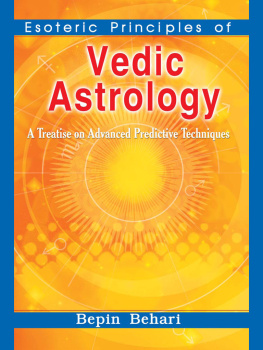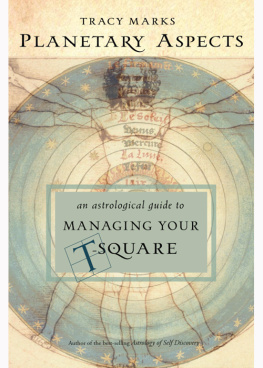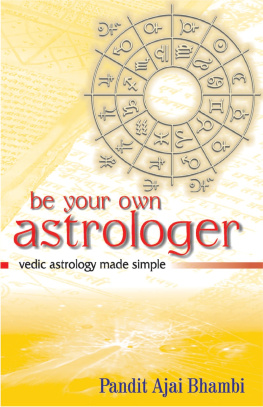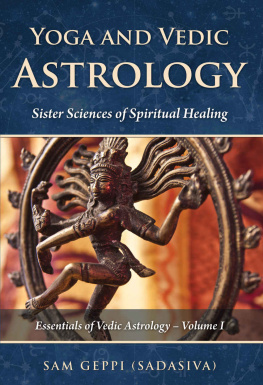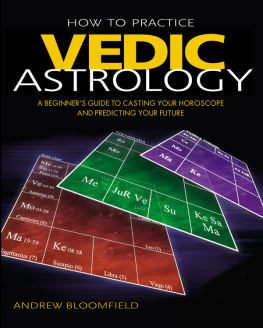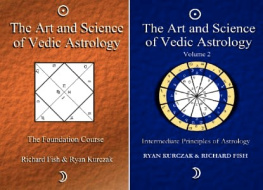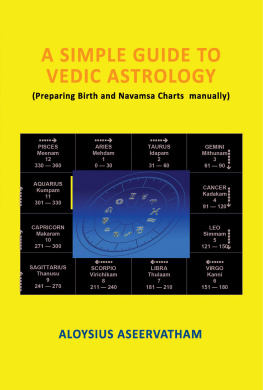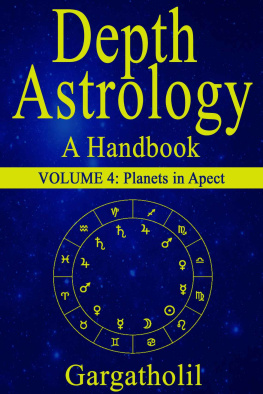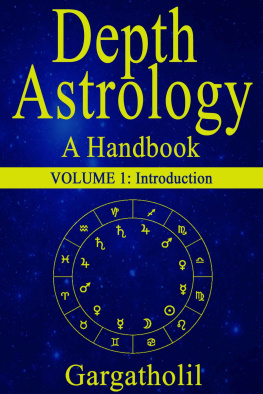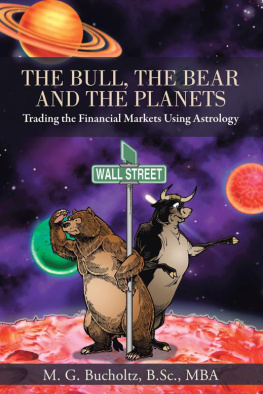Copyright
STERLING PAPERBACKS
An imprint of
Sterling Publishers (P) Ltd.
A-59 Okhla Industrial Area, Phase-II,
New Delhi-110020.
Tel: 26313023, 26320118, 26916165, 26916209
E-mail: ghai(@nde.vsnl.net.in
www.sterlingpublishers.com
Esoteric Principles of Vedic Astrology
A Treatise on Advanced Predictive Techniques
2003, Bepin Behari
ISBN 81-207-2560-3
Reprint March 2003
Reprint 2003
All rights are reserved. No part of this publication may be
reproduced, stored in a retrieval system or transmitted, in
any form or by any means, mechanical, photocopying,
recording or otherwise, without prior written permission
of Sterling Publishers (P) Ltd, New Delhi
Edited by Anandi Iyer
Published by Sterling Publishers Pvt. Ltd., New Delhi-110020.
Laserset at Laser Print Craft, Delhi-110051
Preface
Serious students of Hindu astrology have recently become concerned about the status of this ancient subject. There is considerable scepticism about astrology and astrological predictions. Occasionally there occurs vehement outbursts from ill-informed and misguided physical scientists against this ancient occult science.
During the Vedic period, the people were clear about their goal in life and lived in harmony with Nature. They lived a life which was in harmony with the seen and unseen powers regulating and guiding human development. In Indian scriptures when stellar configurations were mentioned on important occasions such as births of sovereigns, avatars, and wars between the devas and the asuras, the basic objective was to show that every event in our life takes place according to a divine plan, which could be deciphered by those who already knew the language of the stars. The knowledge of this science was given out to make the people conform with their inner nature and ultimate destiny and beneficent natural forces. Presently, we have slipped away from this spiritual goal, so even the ancient science of astrology lost some of its ancient shine. But nowadays, some serious students are coming up who desire to revive the pristine glory of this occult science, retrieve this esoteric knowledge and reinstate its original status.
The basic principles of Hindu astrology which prevailed during the Vedic civilisation, disappeared during the last thousand years or so but some of its superficial aspects remained with the public, to remind of its past glory and vast possibilities. Since the middle of the last century, there has been a revival. Vedic astrology is an ancient science and a subject with great possibilities. It is considered a system of knowledge which could unveil a bit of our future. It is also felt that it has a great potential for providing an impetus for pious living. The impetus thus received made many self-effacing volunteers search for ancient manuscripts, bring them to light, translate them into modern languages and disseminate them for wider consumption. This great efflux of predictive rules increased the popularity of the subject. Books on astrology began to appear in public. Many astrologers began to make remarkable predictions. This was indeed a very encouraging comeback.
Temptation to make use of the subject for undesirable objectives, however, could not be checked. During the Second World War, each side began to recruit astrologers to read the charts of army generals and to seek their help in destroying the enemys manoeuvres. The revelations of the hidden messages of Nature became a means of acquiring personal glory and to destroy mankind. The cessation of armed hostilities brought to the fore the emergence of many new political parties and a new brand of industrialists. They became regular customers of this new commodity. Every street corner became full of astrologers who could predict the fluctuations in the stock exchange, the fate of political parties, and the behaviour of other countries. It was a period of great expansion of the astrological market. This deflected the gaze of serious students from the basic objectives of the occult science and in competition with the newly emerging brand of astrologers, they could not succeed in retrieving the earlier grandeur of the subject.
There are two main reasons for serious concern. First, the growing technological advancement along with its social and psychological fall-out made the new physical scientists much against astrology. Second, the ancient seers had emphasised the need for austerities and spiritual code of life for those who practised this subject for revealing future to others. This was a very difficult requirement which very few persons could or were prepared to practise. Thus there has been a revolt against the revival of ancient astrology in the new world. It required that those who delved in this subject acknowledged the reality of the unseen forces and the unseen deities. Those who did not have occult siddhis and clairvoyance, vehemently denied such possibilities. Yet they liked to experiment and assess the validity of astrological predictions. They are the persons who present the greatest hindrance against the propagation of ancient astrology.
A new factor relevant in the present context has been the approach of the present day (serious) astrologers. There are many pious astrologers who are practising the subject in right earnest, but they think that the astrological knowledge is concerned only with predictions of ones future and suggestion of palliatives. But there is a positive aspect of the subject as well. Astrology is not concerned with maladies, afflictions, child births, promotions, marriages and sorrows of life. Presently, many thoughtful persons have begun questioning the purpose of life, meaning of death, the basic causes of their adverse conditions of life and such other matters. They are concerned with fundamental questions of sorrows, anomalies of lifeconditions, and the best-suited course for them. These are some of the questions with which astrology is, in fact, vitally related. This is a new dimension in the emerging scenario of astrological counselling. The present study aims at showing the relevance of astrology in this context.
The present study throws some new light atleast on the five aspects of astrological counselling. First, the emerging attitude to astrology does not require silencing the opponents and the psuedoscientists who are increasingly becoming impatient with (and even afraid of) growing popularity and new proofs of the validity of astrological predictions and its rationale. There are some astrologers who think that the so-called scientists must be silenced otherwise their (astrologers) profession, earnings and sustenance would be jeopardised. But in case, new scope of astrological counselling is accepted and the astrologers reorient themselves to new dimensions of astrology and wean themselves away from sensationalism, their apprehensions could to a great extent be eliminated.
Second, the new astrological science should take into consideration the wisdom-base of world religions in deeper understanding of astrological principles. An Introduction to Esoteric Astrology aimed at showing that the ancient religions of the world have much to contribute to the understanding of zodiacal signs and the planetary disposition. Later, A Study in Astrological Occultism, tried to show that astrology is a part of the science which tries to understand deeper impulses. It also tried to indicate that astrological principles could be helpful in ones yogic practices. Myths and Symbols of Vedic Astrology discussed in depth how zodiacal signs, planets and nakshatras are parts of extensive occult forces working behind human evolution and how the ancient seers explained these laws in mystery languages which could be studied with advantage by us. In the present study, we have devoted a major portion of the study in giving certain basic principles of this line of research which can be effectively pursued further by those who wish to do so.

